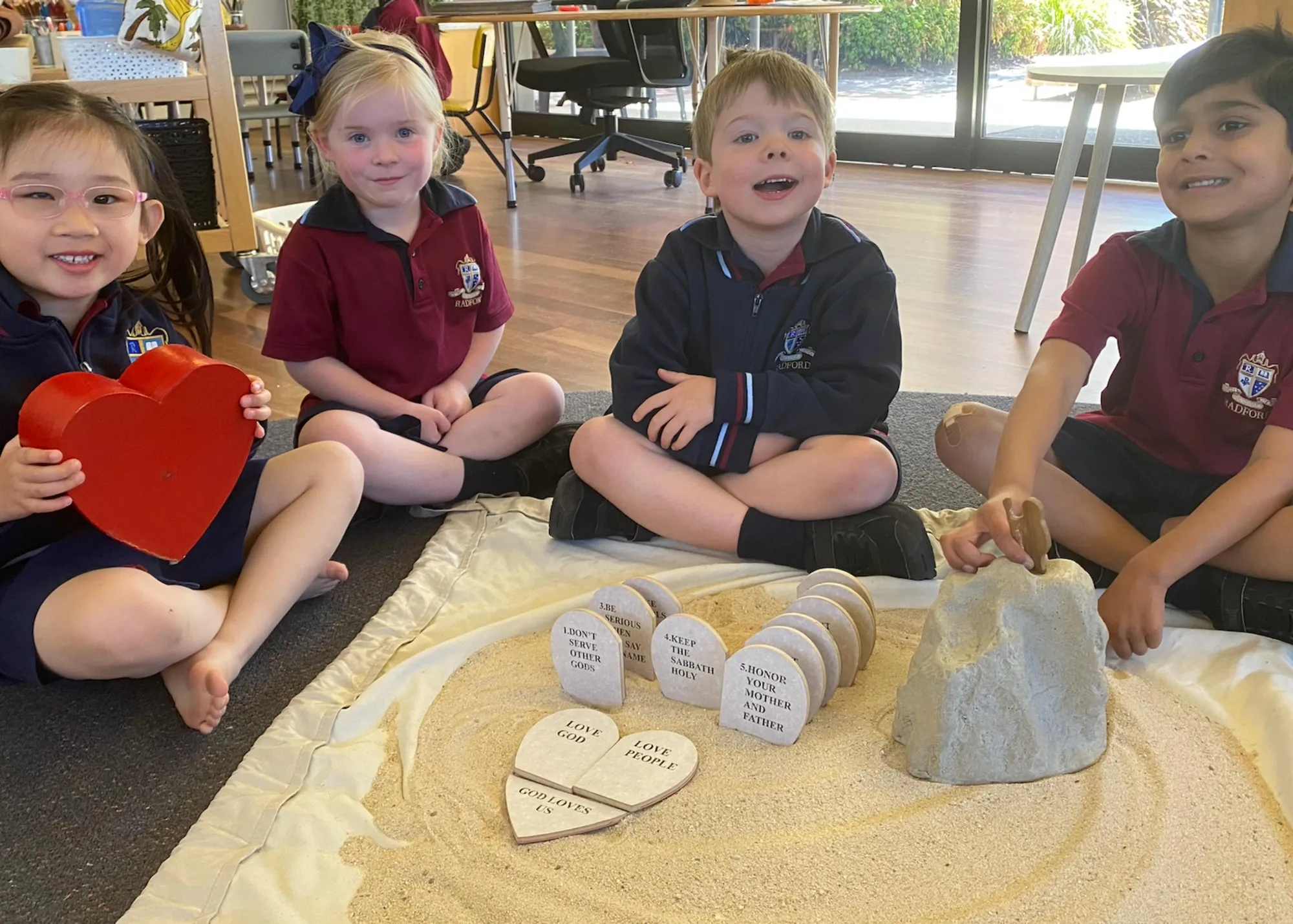Following the Ten Commandments Today
By Rev. Dr Katherine Rainger, Senior Chaplain
I wonder what comes to mind when you think of the Ten Commandments. Maybe Charlton Heston’s epic film The Ten Commandments, Indiana Jones' search for the lost Ark of the Covenant, or that episode of the The Simpsons?
I remember studying The Crucible at school and the poignant scene in which John Proctor is asked to recite the Ten Commandments. He recites nine of them easily, however, he cannot recall the commandment about adultery. His lapse in memory gives the audience an insight into where the plot is heading.
The Ten Commandments are a moral code shared by Jews and Christians. Their influence extends beyond cultural and religious references and into our secular laws. At their heart, the Ten Commandments are an invitation to a right relationship with God and each other.

In Godly Play, a hands-on approach to biblical storytelling and spiritual formation, the Ten Commandments are taught as ‘the ten best ways’. They are kept in a heart-shaped box. Radford students in Pre-Kindergarten to Year 2 are introduced - in age-appropriate ways - to the biblical story of Moses, who received the 'ten best ways' on Mount Sinai. The commandments are summed up as: "Love God, love people, God loves us."
Matthew Schlimm has written an insightful piece that explores the interpretation of each commandment in the past and present. There are aspects of the Ten Commandments that need unpacking for context and application. For example, the reference to slaves is both troubling in terms of normalising slavery and enlightened in the sense that slaves were also included in the edict to rest on the Sabbath and, therefore, to cease work for a period.
As I approach the Ten Commandments, I am struck by their relational nature. The first three speak of relating to the God who liberates and renews; the God who has revealed himself as the one who has called the people out of slavery under the pharaoh in Egypt and into a new future.
Commandments five to ten speak of relating to each other in a community in which our individual actions have the potential to heal and to harm. The commandment not to covet is an invitation to contentment in a world that encourages us to ‘keep up with the Joneses’ at any environmental or personal cost.
The fourth commandment is a hinge that links our relationship with God and each other. Sabbath rest is a gift. It is an invitation to enter the holiness of rest, to have a break from work, to be renewed and refreshed, and to be open to God, ourselves and each other. As people made in the image of God, we both honour and imitate God in taking time to rest.
Here are the Ten Commandments, adapted from Exodus 20:1-17, from the New Revised Standard Version of the Bible:
And God spoke all these words:
- I am the Lord your God, who brought you out of Egypt, out of the land of slavery. You shall have no other gods before me.
- You shall not make for yourself an image in the form of anything in heaven above, or on the earth beneath, or in the waters below.
- You shall not misuse the name of the Lord your God.
- Remember the Sabbath day by keeping it holy. Six days you shall labour and do all your work, but the seventh day is a sabbath to the Lord your God. On it you shall not do any work, neither you, nor your son or daughter, nor your male or female servant, nor your animals, nor any foreigner residing in your towns. For in six days the Lord made the heavens and the earth, the sea, and all that is in them, but he rested on the seventh day. Therefore, the Lord blessed the Sabbath day and made it holy.
- Honour your father and your mother.
- You shall not murder.
- You shall not commit adultery.
- You shall not steal.
- You shall not give false testimony against your neighbour.
- You shall not covet your neighbour’s house. You shall not covet your neighbour’s wife, or his male or female servant, his ox or donkey, or anything that belongs to your neighbour.
Below is a prayer for Sabbath rest that we can pray for ourselves while also praying for those in our world who long for violence to end and peace and justice to prevail.
God of rest,
today I make the active choice
to enter into your rest,
and to join with you
in delighting in this good world you have made,
and dreaming of the perfect world you will remake.
I choose to tune out,
of demands and deadlines,
of performance pressures,
of flickering screens,
of that which robs my soul of joy,
and the ways in which the world
seeks to define and shape my identity.
I choose to tune in,
to your affirmation and love,
to the celebration of freedom,
to worship and your word,
to the enjoyment of that which fills my soul with joy,
and reminds me of my identity in Christ,
as a deeply loved child of God.
Amen
